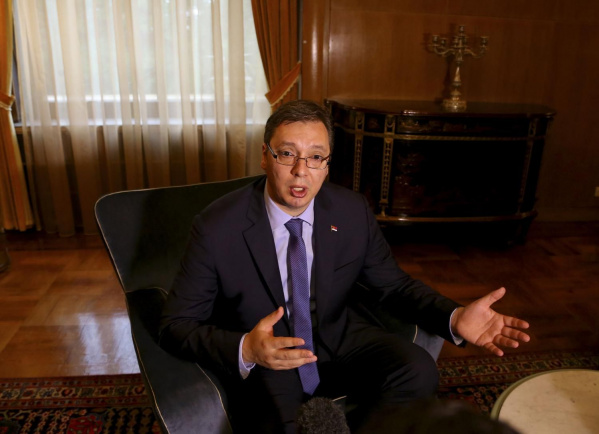
PM Vucic: Washington and Belgrade must not allow EU integration to languish
By Aleksandar Vucic - - Wednesday, September 30, 2015
Historically, my country has been a staunch ally of the United States that has fought both world wars side by side. Since 2000, Belgrade and Washington have not only been jointly removing the causes and the consequences of an anomaly that occurred in bilateral relations with the NATO intervention in 1999, but have been forging a new relationship based on mutual trust and shared interests, simultaneously fighting organized crime, drug-trafficking, terrorism and — most importantly — rebuilding stability and prosperity in the Western Balkans.
After regaining statehood in 2006, Serbia joined NATO’s Partnership for Peace program, and saw its first Individual Partnership Action Plan with NATO enter into force by decision of the North Atlantic Council this January. Some 300 members of Serbia’s professional standing army serve in different U.N. peacekeeping missions across the Mediterranean, Middle East and Africa, and — since 2011 — in EU-led operations. Today Serbia is playing a notable role in helping alleviate the humanitarian crisis onset by an unprecedented influx of refugees via the “Balkans route” toward the EU.
Over the last 15 years Washington and Belgrade have reached solid ground on which to build a mutually beneficial relationship for the 21st century. The government has introduced a set of long-term structural reforms yet maintaining the country’s 15-year track record of stability. The economic reforms yielded first results: public spending cut by 2.2 percent, unemployment by 2.4 percent and the fiscal deficit by a notable 45.5 percent year by year. Ambitious public-sector reforms are aimed at developing a professional administration capable of seeing the reform process through, and tackling the normative challenges of EU integration. While Washington and Belgrade focus on forging stronger bilateral relations, converging on common values and interests, it is high time more U.S. companies — like their European counterparts — ventured into Serbia and actively engaged Serbia’s vibrant human capital and investment opportunities.
We are profoundly aware that the superficial and plainly wrong international image of the Balkans as the “powder keg of Europe” will not change by itself, and Serbia has been investing much political energy into driving a sustained reconciliation effort throughout the Western Balkans. Serbia’s consecutive democratic governments have been determined to resolve all outstanding differences, even the unilateral declaration of independence of Kosovo, the European way — through dialogue. As a prime minister of Serbia, I have engaged in a “reconciliatory offensive.” Last year, I proposed setting up of the Regional Youth Cooperation Office of the Western Balkans modeled on more than 50 years of Franco-German Youth Office’s exceptional experience following World War II. Earlier in July, not being dissuaded by the rock-pelting incident in Srebrenica, while paying respects to the Bosniak victims at Potocari, I hosted Bosnia and Herzegovina’s three-person presidency in Belgrade for a joint intergovernmental meeting, sending a message of tolerance and reconciliation. As a beacon of reconciliatory politics in the region, Serbian-Albanian relations entered an unparalleled era of rapprochement with first bilateral visits in 70 years. To honor the innocent victims of the 1990s conflicts, I proposed introducing a common Remembrance Day throughout the territory of former Yugoslavia. When instituted, it may prove a valuable symbolic step in overcoming past tragedies and shaping a restorative, European future for the new generations in the Western Balkans.
Despite recent successes made in reintegrating the Western Balkans, foremost through the “Berlin Process” and Western Balkans Summits, the last of which was held in Vienna this August when the core infrastructure network for the Western Balkans, the Youth Office and the framework for peaceful resolution of bilateral questions on the road to EU integration were publicly confirmed, a lot more remains to be done. Serbia and the Western Balkans need and deserve Washington’s renewed political attention and support to accelerate EU integration, resolve outstanding bilateral disputes that stand in the path of European integration, attract foreign direct investments, and tackle the ongoing refugee crisis.
The United States must not leave the Western Balkans as “unfinished business,” but crown its own — and the region’s — decades-long efforts with the success of the region’s renewed prosperity, reintegration and EU integration.
• Aleksandar Vucic is the prime minister of Serbia.
Source: washingtontimes.com

